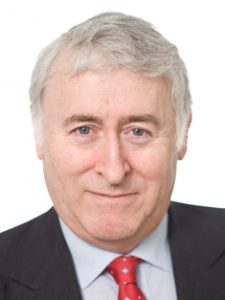 Simon Dinnick has specialised in helping doctors and dentists throughout his career as a practising solicitor. He has worked for all the major medical defence and protection organisations, as well as hospital trusts and private health providers. Simon joined our Board of Trustees in 2016, and has been Chair of the Grants & Awards Committee since August 2020.
Simon Dinnick has specialised in helping doctors and dentists throughout his career as a practising solicitor. He has worked for all the major medical defence and protection organisations, as well as hospital trusts and private health providers. Simon joined our Board of Trustees in 2016, and has been Chair of the Grants & Awards Committee since August 2020.
We asked for Simon’s insight into the difference that financial assistance can make for doctors, medical students and their families.
Q. Why is financial support for doctors and medical students so important?
In this role, I’m regularly reminded that misfortune can befall anyone at any stage in their life. We all live by a financial thread that can be stretched or broken at any moment through unanticipated illness or accident. When someone has this kind of setback, their long-standing student debt, frighteningly high mortgage payments, or steep childcare costs don’t suddenly go away. The stress of these things can then exacerbate the very illness or disability that caused issues in the first place. We see our role as helping students and doctors stay in kilter, until restored to their own equilibrium – or if necessary, to provide longer-term support.
Q: You’re Chair of the Grants & Awards Committee. Can you tell us more about what the committee does?
We meet six times a year to consider requests for financial assistance from qualifying doctors and students. We typically receive 15 to 20 new cases for discussion at each meeting, and review existing beneficiaries on a regular rotational basis. Our Casework team prepare reports on each applicant’s health and financial circumstances, to help us reach sympathetic and fair conclusions on the nature and extent of support to be offered.
Every applicant is an individual, so there is no one-size-fits-all package of support. The financial assistance we offer might help pay for living costs, childcare support, medical equipment, or back-to-work expenses and retraining – we aim to match the support to the individual’s circumstances.
I think the fact that we offer this direct financial help is reassuring for the RMBF’s supporters, too. You really are able to see where your donations are going.
Q. Can you give us an example of someone the RMBF has helped?
The Committee’s deliberations are confidential. It is vital that applicants, who may naturally be reticent or embarrassed to seek help, have the comfort of knowing their circumstances will remain private. Encouraging people to seek help without stigma is one of our cornerstones.
That said, I want our supporters to understand the impact that their donations have, so I will give some insights. For example, we regularly give financial grants to help really capable students complete their training, when they have suffered personal or family illness which has interrupted their route to qualification. We helped the family of a doctor who was being treated for cancer and sadly died. We’ve helped protect bereaved spouses from financial hardship, when their partners’ pensions have been lost to them. These are just a few examples.
Q. Over its long history, the RMBF has evolved to meet the changing needs of the medical profession. What have been the trends in recent years?
The RMBF has come a long way from its “poverty, widows and orphans” heritage. The Committee increasingly sees much more immediate and short-term need, as well as providing complex long-term support. Recently our help has been covering more sudden cash flow difficulties, involving housing or rental problems.
We have seen the average age of our beneficiaries coming down, as health and financial hardships interrupt young doctors’ careers more and more. This has gone hand-in-hand with an increase in need resulting from mental health or stress-related difficulties. Sadly, alcohol problems and other issues involving addictive behaviour crop up quite regularly, creating their own need for support.
The Committee’s aim is to help all doctors facing any sort of misfortune. When someone asks for help, there is no sense of judgement or criticism in any assessment, but there is understanding. Very often, the experienced professional minds on the Committee can give insights into career difficulties and direction, helping a potential beneficiary to make career adjustments.
Q. What is your message to RMBF supporters?
The help we can offer doctors and medical students is a direct result of donations and legacies. Our inbox is regularly filled with appreciation, and moving messages from our beneficiaries. Your support really gets to the heart of where help is needed.
Find out more about the help we provide for doctors and medical students
